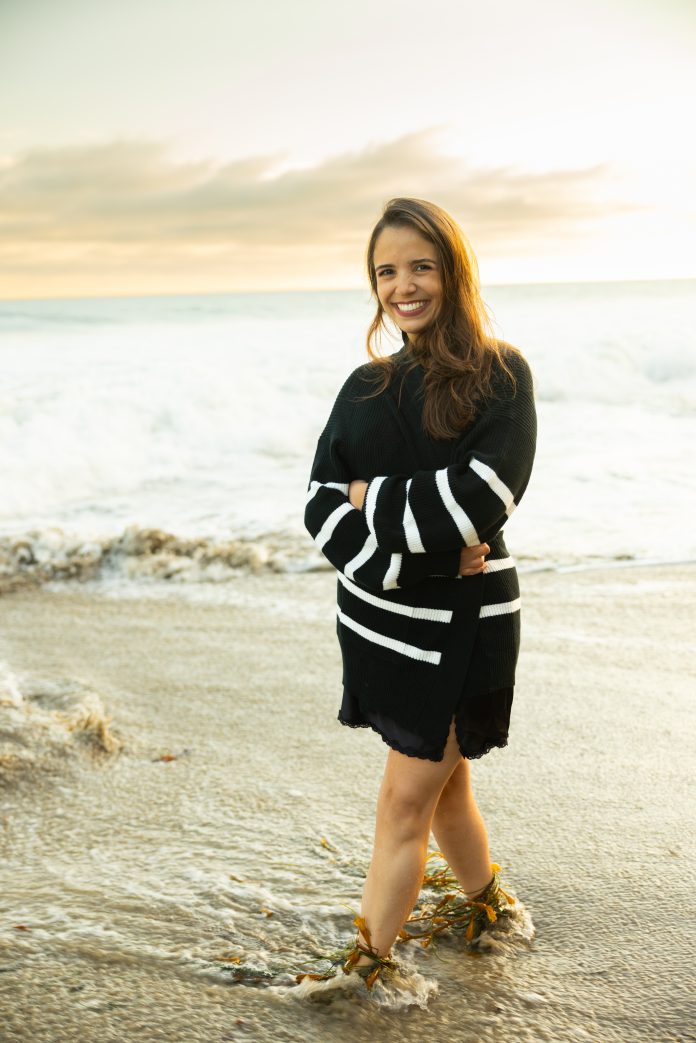Can you provide a brief overview of your short film, including the title and its genre?
Serial Dater is a light comedy that is very close to my heart. The story follows Ana, the main character, through her self-discovery and self-love journey. She is a great girl: smart, funny, intelligent and lovely. But her inner saboteur keeps telling her that she is not good enough and she will never find true love. So, she goes on a bunch of horrible dates to try and find the love of her life. At the end, she makes peace with her inner saboteur and realizes that she doesn’t need to have a man to complete herself, that she is already complete and deserving of love.
What inspired you to create this particular short film?
Since a very young age, I have struggled with my mental health. When I was 12 years old I had anorexia and, since then, I have body dysmorphia. The mirror used to be my worst enemy. Every time that I used to see myself in the mirror, a bunch of bad thoughts and bad ideas used to come into my mind. I am not saying that it doesn’t happen anymore, mental health is not a straight line. But now, I am more aware of that and I can control this “voice”, this “inner saboteur” of mine. So, the antagonist in the movie is based on this antagonist of myself that is there and is always going to be there, but now she is my friend and understands me.
How did the idea for the short film come about? Were there any specific influences or experiences that inspired the story?
My journey with my mental health was the main inspiration for the movie. I think we all have this inner voice that keeps trying to put us down, but if we talk to this voice and understand that it is part of ourselves, the journey becomes way easier. It is easy to see ourselves as the victims, but if we understand that, usually, we are our worst enemies and that there are things that we say to ourselves that we would never say to anyone else, we can start the process of healing.
Can you elaborate on the central theme or message you aimed to convey through the film?
The main message is about self-love. As RuPaul would say: “If you don’t love yourself, how in the hell you gonna love somebody else?” And this is so true. We need to love ourselves and accept our flaws, because, if we don’t, nobody will. And we will not be able to accept other people’s flaws. We are all humans, and I am pretty sure 90% of us are trying to do the best we can, but we need to understand that we will commit mistakes and we can’t be perfect.
Were there any specific traits or qualities you wanted to highlight in the characters?
I think all the characters in the movie are pretty relatable, even the antagonist. I didn’t want an antagonist that would be 100% mean. She is also part of Ana, and she makes her who she is. I didn’t want an antagonist that people would hate. The antagonist is funny and super relatable. Priscilla Runion, who plays the “reflection” of the protagonist, nailed her interpretation of the character that I wrote. I think the reason why she did so well was because she is also the producer of the movie and directed it. The movie is our baby. We understand and love all the characters. There was no judgment from her end while playing the character. Because she knows the character so well, that she loves her, even with the character’s flaws. And this is the idea of the movie.
How did you approach the visual style of the short film? Were there any specific techniques or references that influenced your choices?
I think two big references that I had for the movie was Fleabag and Crazy Ex-Girlfriend. So, at the same time I wanted most parts of the movie to be light and funny, there are also dark moments, when the protagonist doubts herself. These are the moments that the drama hits. At the same time that the movie is funny, there are also parts that are full of drama. I think this is a beautiful way to show life as it is: not always easy and fun, but even the bad moments are worth it.
Can you highlight any memorable or challenging scenes from a cinematographic perspective?
The most challenging moment for me was when I needed to cry in one of the scenes. It is very hard to cry without a reason for me. And I was really afraid of not being able to cry when it was needed. But the director and the whole cast and crew were so amazing, giving me 5 minutes to concentrate on the scene and being able to cry. Of course that, since the movie was written by myself and was based on my life, it was easier to find the emotions to be able to cry, but, even so, it could have been a problem if Priscilla, the director, didn’t give me a moment to concentrate. I am very grateful for her and her empathetic way of directing.
What was the most rewarding aspect of the production process for this short film?
For sure the people involved in it. Everyone was so excited about the project, so on point, prepared and talented. I can’t believe that we had so many great people involved in this project! Hard working people, full of dreams, great humans and professionals. I am so grateful for every single person that was part of it. I can’t believe how lucky I am to be attached to them and their beautiful souls.
Were there any unexpected challenges during filming, and how did you overcome them?
I think the biggest challenge was dealing with the limited time we had to shoot it. We shot 19 pages in one day. This was very ambitious of us, but we made it!
How did you go about casting for the short film? What qualities were you looking for in the actors?
I am very lucky to know a lot of talented people in this city. For this movie, I wanted relatable people and funny people. And I can’t believe how on point all of them were with the timing for the jokes and how they were all well prepared for it. When we are making a comedy, we need actors that don’t take themselves so seriously and it is very hard to find actors that don’t have big egos and are ok with laughing about themselves. I am very proud of the cast. They are all so funny and talented.
Can you discuss any memorable moments or surprises that occurred during the filming of specific scenes?
I think one of the best moments was when we were shooting one of Ana’s dates. Richard Follin, the actor that played my date on the scene, was so funny that I couldn’t stop laughing. The crew members either. We have a bunch of bloopers of this scene, because his timing and his expressions were so on point that I couldn’t hold myself back. He is a genius of comedy, let me tell you something…
Can you talk about the role of music and sound effects in enhancing the overall viewing experience?
We have an original song for the movie with music and lyrics by Luis Figueroa, this wonderful composer and human. He is a great person and a great partner. He got the character of Ana so well and understood the story that I wrote so perfectly that he could translate everything that I wanted to say in 19 pages in one song. It is a powerful and sweet song about self-love and the voice of Priscilla Runion singing it made everything perfect. The name of the song is Unconditional Love and it is a banger! After we shot the scene where the song appears for the first time, I could hear some crew and cast members singing it throughout the day. It was very special to me to see how people loved the song as much as I loved it.
What emotions or reactions do you hope the audience will experience while watching your short film?
I hope people have fun watching the movie. I want people to laugh, but at the same time I want them to think about the message of self-love of the movie. I want them to finish the movie and love themselves a little bit more than when they started it. This is what I expect.
How do you envision your short film resonating with viewers?
I want them to love it as much as I love it and I want to help people to heal. I want to make the world a better place and make people feel validated and worthy.
What lessons did you learn from creating this short film that you will carry forward into your future projects?
I think the biggest lesson I learned was about friendship and love for art. I want people that can help me and that I can help too. We are all dreamers in this industry, and I want to fulfill my dreams, of course, but at the same time I want to take everybody that I can with me to the top. And I will always remember every single person that made this project come to life. I want to keep them in my life and in my projects as much as I can. I want to have people that believe in me around me and that help me to put my ideas into practice. And all the beautiful people involved in this project are very important to me now. I hope I don’t let them down and that we can all achieve the top together, being good people and not taking advantage of anyone.

















